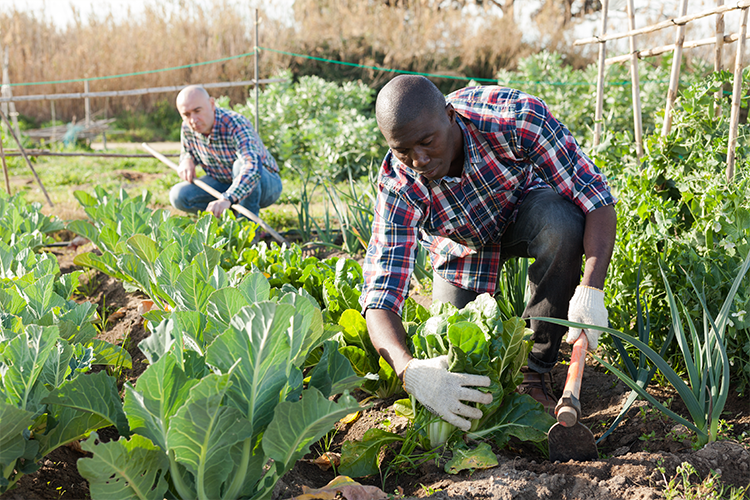FEBRUARY 2024 TOOLKIT
CELEBRATING 1890 LAND-GRANT UNIVERSITIES
Black History Month provides a timely opportunity to reflect on the 1890 land-grant institutions’ impactful work and ongoing efforts that are shaping a more promising future. Throughout its 134-year distinguished history, these higher education institutions have played crucial roles in advancing agricultural research, education, and Extension to enhance the quality of life in their underserved communities. Through their expertise, collaboration, and dedication, 1890 institutions are continuing to build a more equitable, inclusive, and sustainable future throughout our nation.
1890 land-grant institutions include:
Alabama Agricultural and Mechanical University • Alcorn State University • Central State University • Delaware State University • Florida Agricultural and Mechanical University • Fort Valley State University • Kentucky State University • Langston University • Lincoln University • North Carolina Agricultural and Technical State University • Prairie View Agricultural and Mechanical University • South Carolina State University • Southern University and Agricultural and Mechanical College • Tennessee State University • Tuskegee University • University of Arkansas Pine Bluff • University of Maryland Eastern Shore • Virginia State University • West Virginia State University
According to the 1890 Foundation, the Centers of Excellence are the flagship initiative of the 1890s system that emphasizes cutting-edge research, dynamic teaching programs to increase academic achievement, and Extension activities. These centers support agricultural production and address nutrition and health disparities. They also build capacity for underserved producers, families, and communities through multidisciplinary and multi-institutional collaboration.
For example, Southern University, the host of the 1890 Center of Excellence for Nutrition, Health, Wellness and Quality of Life, launched a pilot nutrition hub in partnership with the U.S. Department of Agriculture in September 2023. The new Agricultural Science Center of Excellence for Nutrition and Diet for Better Health (ASCEND for Better Health) initiative provides science-based, nutrition-related information at the community level, particularly in underserved communities impacted by diet-related chronic diseases.
Source: ASCEND for Better Health | Nutrition.gov
RESEARCH
Tuskegee increases AI use in land-grant programs
Tuskegee University is collaborating with AI FARMS (The Institute for Artificial Intelligence in Future Agricultural Resilience, Management and Sustainability) to integrate new technologies into the university's research, teaching, and Extension infrastructure. AI FARMS is a central hub for interdisciplinary research, aiming to propel fundamental advancements in artificial intelligence (AI) and apply these breakthroughs to address global agriculture challenges. The institute prioritizes technologies that impact production practices, emphasizing autonomous farming, efficiency enhancement for livestock operations, environmental resilience, soil health, and technology adoption.
Source: Dec.-23-ARD-Updates.pdf (umes.edu)
Langston University researchers evaluate small ruminate methane emissions
The Langston University Sherman Lewis School of Agricultural and Applied Sciences has expanded its effort to support climate-smart agricultural practices and build sustainability in animal production. The research team has made several discoveries that have been shared with small ruminant producers. Results have shown high levels of effectiveness and are also economically viable. For example, results show that changes in feed ingredients can lower methane production from ruminants. Another effective solution is the supplementation of vegetable oils to lower enteric methane in small ruminants.
Source: ARD-Updates-July-23.pdf (umes.edu)
Early research shows essential oils may improve fruit shelf life
Many people are concerned about chemical residues on fresh produce. Safer alternatives are being studied and developed. One method being studied is using essential oils extracted from various potentially beneficial plants. To safely improve shelf life, Virginia State University researchers are examining the gene expression of several genes that regulate fruit firmness in essential oil-treated strawberries.
Source: ARD-Updates_August2023.pdf (umes.edu)
EDUCATION AND WORKFORCE DEVELOPMENT
1890 land-grants universities are working closely with USDA to address workforce development needs. For example, USDA’s From Learning to Leading: Cultivating the Next Generation of Diverse Food and Agriculture Professionals ("NextGen”) program will enable higher education institutions to engage, recruit, retain, train, and support students in order to build the next generation of the food, agriculture, natural resources, health and human sciences, and USDA workforce.
Minority-serving institutions are leading NextGen projects. USDA’s $262.5 million federal investment will provide training and support to more than 20,000 future food and agricultural leaders through 33 project partners across 24 states resulting in partnerships across more than 60 academic institutions and organizations.
Source: Biden-Harris Administration Announces Inaugural “From Learning to Leading: Cultivating the Next Generation of Diverse Food and Agriculture Professionals Program” | USDA
EXTENSION
Nutrition, Health and Wellness of Individuals, Families and Communities
The Delaware State University Expanded Food and Nutrition Education Program (EFNEP) educates individuals and families in Kent County, Delaware, on how to make informed decisions about wise food choices, safety and budgeting. Working with the peer support and resource center, Brandywine Counseling & Community Services Inc., participants learned basic nutrition, how to achieve the goal of consuming five fruits and vegetables each day, and the importance of physical exercise.
Youths, Families and Communities’ Resilience and Sustainability
Fort Valley State University is empowering Georgia’s underserved youths and families through its Healthy Habits 4-H Village Community Garden Outdoor Research Laboratory of Learning Program. The community garden, located in Sylvester, Georgia (a poverty-stricken rural community of less than 6,200 residents), has fed more than 10,000 people fresh produce from 2014 to 2023 at no cost. The program provides quality healthy living education to community members.
Agricultural Profitability and Sustainability of Small-Scale Farms
Plasticulture production can increase yield and extend the growing season. Small farm owners could benefit from this production method to increase yield and profit; however, plasticulture equipment is expensive. To make plasticulture production more accessible, North Carolina A&T State University Extension created the Plasticulture Rental/Cash Back Program, providing equipment to farmers for rent for $25 per day. Extension agents offer technical assistance on the equipment to small farmers to enhance plasticulture operation.
Adapted from: 1890 Extension Transforming Lives (umes.edu)
For well over a century, the dedicated professionals at the 1890 land-grant institutions have improved Americans lives by strengthened agricultural research, education, and Extension. Today, their essential work is accelerating to solve critical local, national, and global challenges. Through their collaboration within the 1890 system as well as with colleagues at the 1862 land-grants, 1994 (Tribal Colleges and Universities), Alaska-Native and Native Hawai’ian-serving, insular land-grant universities, and Hispanic-serving Institutions, they are building a more equitable and sustainable future for our communities and nation.
SOCIAL MEDIA
SAMPLE POSTS
Celebrating 1890 Land-grant Universities
The #19Strong 1890 #LandGrantUniversities support underserved communities through research and Extension programs focused on healthy eating, physical activity, entrepreneurship, and improving the economic conditions of small farmers. https://landgrantimpacts.org/wp-content/uploads/2023/03/1890-Summary1-BridgingGaps-newBP.pdf
Black History Month
In honor of #BlackHistoryMonth, @SCHOOL celebrates the achievements of NAME for THEIR contributions to the advancement of agricultural research: PROJECT
.@SCHOOL celebrates Black Extension educators this #BlackHistoryMonth! Meet NAME, who serves COUNTY/STATE communities. NAME works directly with local producers in our community to share the latest cutting-edge research from @UNIVERSITY.
Feel free to reach out to us with specific posts that you would like @AgIsAmerica to share. Please email your request to Kim Scotto at agcomms@aplu.org or use #AgIsAmerica.
HASHTAGS AND HANDLES
HASHTAGS
#LandGrantUniversities
#AgIsAmerica
HANDLES
|
Ag is America |
@AgIsAmerica |
|
APLU Ag |
@APLU_Ag |
|
Sec. Vilsack (Secretary of Agriculture) |
@SecVilsack |
|
USDA |
@USDA |
|
USDA National Institute of Food & Ag |
@USDA_NIFA |
|
APLU |
@APLU_News |
|
Cooperative Extension |
@Ext100Years |
CALENDAR
FEBRUARY HOLIDAYS
MONTHS
American Heart Month, #AmericanHeartMonth
Black History Month, #BlackHistoryMonth #BHM
National Cancer Prevention Month, #CancerPreventionMonth
National Canned Food Month, #CannedFoodMonth
National Cherry Month, #NationalCherryMonth
National Grapefruit Month, #NationalGrapefruitMonth
WEEKS
February 26 – March 3 – National Invasive Species Awareness Week, #NISAW, #InvasiveSpecies (NISAW Toolkit)
DAYS
February 2 – World Wetlands Day, #WorldWetlandsDay
February 9 – National Pizza Day, #NationalPizzaDay
February 14 – Valentine’s Day, #ValentinesDay
February 16 – National Almond Day, #AlmondDay
February 17 – National Cabbage Day, #NationalCabbageDay
February 26 – National Pistachio Day, #NationalPistachioDay
February 27 – National Strawberry Day, #NationalStrawberryDay
Source: February - National Day Calendar



